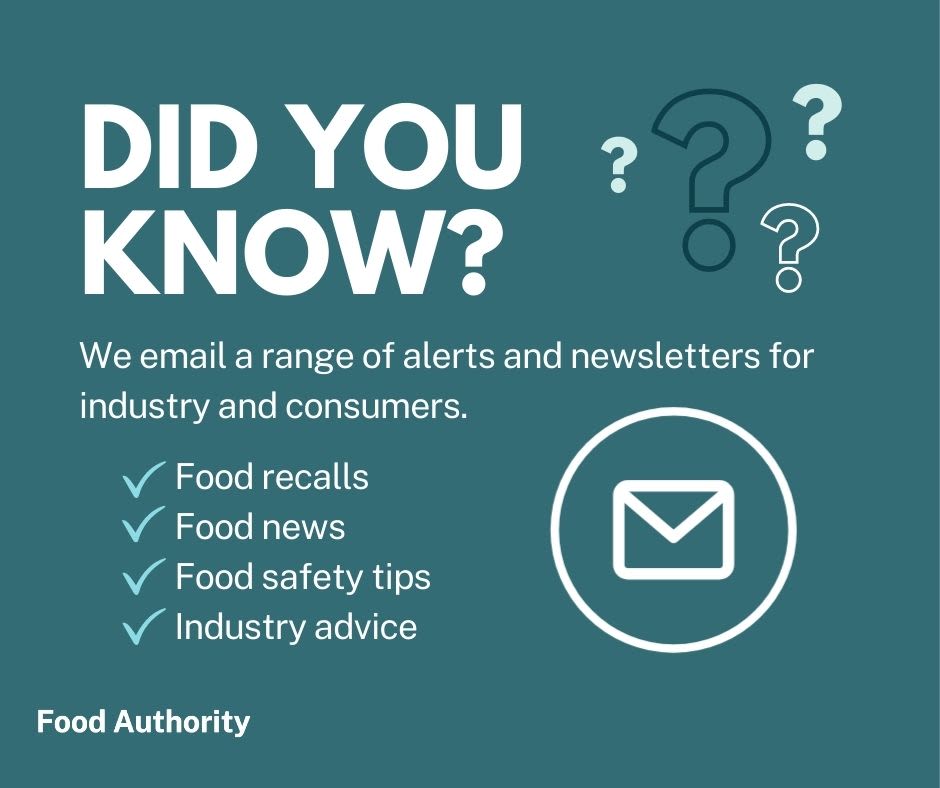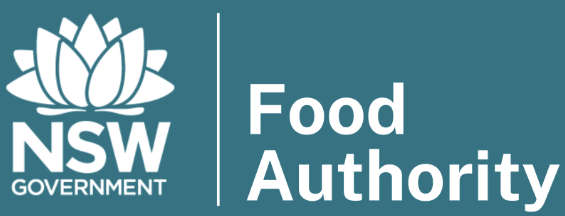Foodwise Winter
Winter 2024 | Issue 68

Foodwise - winter edition
Welcome to the quarterly newsletter from the NSW Food Authority, with the latest information for the NSW food industry.
Highlights in this edition include:
- Celebrating 20 years of safe food
- Best use of Precautionary Allergen Labelling is VITAL
- Avian influenza is not a food safety concern
- Food safety the order of the day at Northern Beaches event
- Leading the way and winning Awards for raw milk cheese production
- TPA Workshop – the future of food
Is there something you’d like to see in Foodwise? Let us know at food.contact@dpi.nsw.gov.au or phone 1300 552 406.
Celebrating 20 years of safe food
The NSW Food Authority is celebrating 20 years of keeping the state’s food safe and protecting the health and wellbeing of the people of NSW.
Since 2004, we have worked closely with the food industry, NSW Health, local councils and the wider community to reduce foodborne illness and its impacts.
NSW Food Authority CEO Dr Lisa Szabo said the Food Authority had many wins in improving food safety standards and reducing foodborne illness over the past two decades.
“Looking ahead, the Food Authority’s focus is to reduce foodborne illness partnering with industry, other jurisdictions and consumers, as well as modernising the state’s food regulation system, and embracing new technologies as they evolve,” she said.
“As we celebrate this 20-year milestone we acknowledge and thank all those who contribute to delivering safe food for the people of NSW.”
Fast food facts
Each year the NSW Food Authority:
- investigates around 300 foodborne illness outbreaks involving two or more people
- licenses 14,600 food facilities
- conducts around 5,000 audits on food producers and processors
- supports over 55,000 retail food businesses
- responds to over 20,000 helpline enquiries and reports from industry and consumers
- has more than 1.5 million unique visits to its website foodauthority.nsw.gov.au.
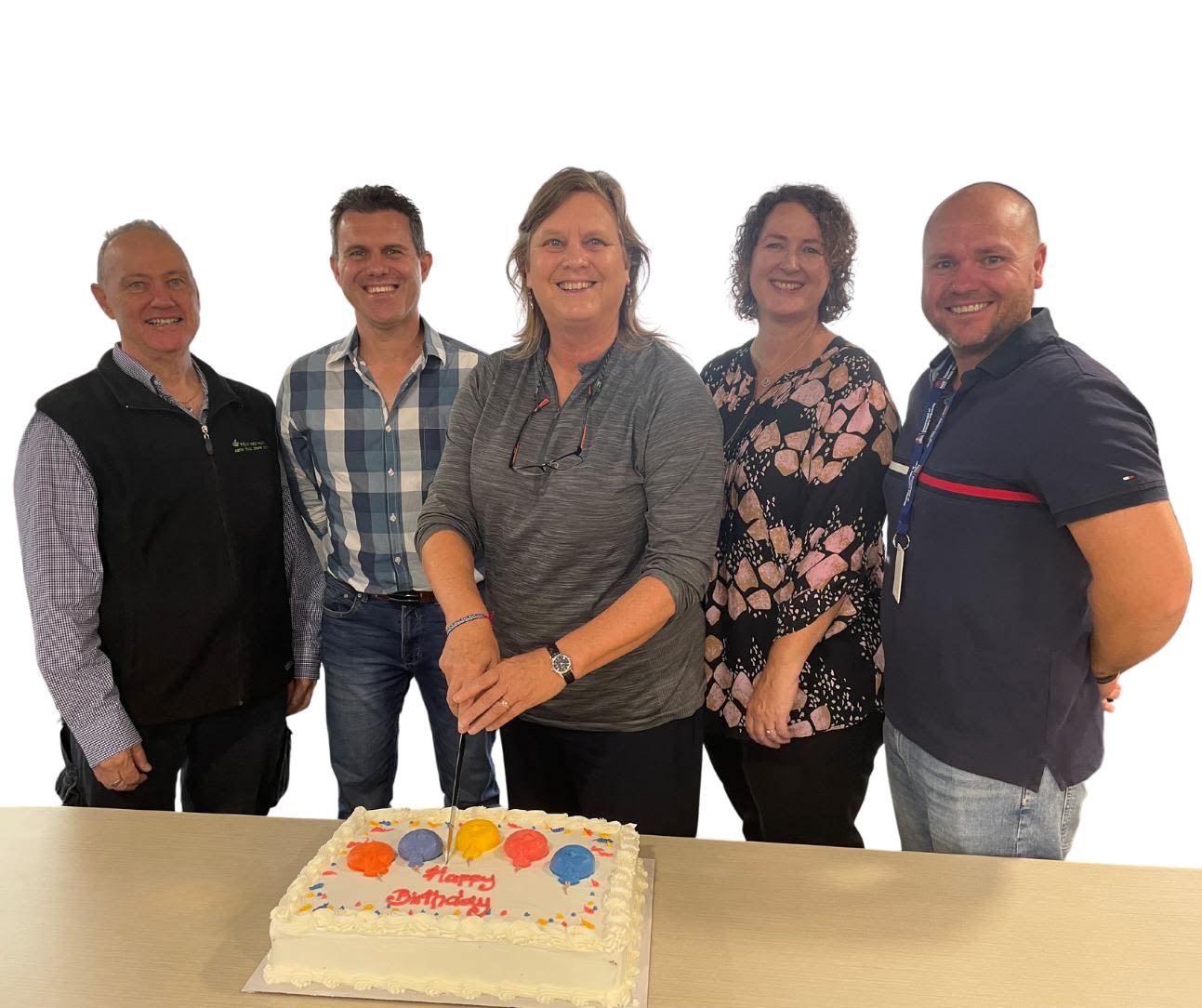
NSW Food Authority CEO Dr Lisa Szabo (centre) cuts the birthday cake with Senior Food Incident Response and Complaints Officer John Shields, NSW Shellfish Program Manager Anthony Zammit, Team Leader Regulatory Performance Jane Verwoerd, and NSW Shellfish Program Senior Shellfish Operations Officer Phil Baker, who have worked with the Food Authority since its inception 20 years ago.
NSW Food Authority CEO Dr Lisa Szabo (centre) cuts the birthday cake with Senior Food Incident Response and Complaints Officer John Shields, NSW Shellfish Program Manager Anthony Zammit, Team Leader Regulatory Performance Jane Verwoerd, and NSW Shellfish Program Senior Shellfish Operations Officer Phil Baker, who have worked with the Food Authority since its inception 20 years ago.
Hand washing covered
The award-winning NSW Food Authority hand washing stand returned to this year’s Sydney Royal Easter Show, held 22 March to 2 April, in the Show’s education pavilion.
Expert staff assisted around 30,000 eager showgoers of all ages to uncover their hand washing habits with GlitterBug potion and UV lights. The fun experimental experience uncovered areas that need better cleaning (forgotten thumbs, fingernails and backs of hands) while for others it provided reassurance that they have good hand washing skills before handling food. There was lots of friendly competition among families and friends on who could wash their hands the best.
To expand on the food safety learnings, young participants were given a Food Safety Investigation: kitchen crimes workbook to learn about the golden rules of food safety, along with a practical tool of either a cooler lunch bag or ice brick to keep their food cold at school or when out and about.
In addition, around 1,400 showgoers took time to answer our survey questions on their understanding of and any experience with food allergens. This is part of a research project with findings to be released later in the year – keep a look out for this.
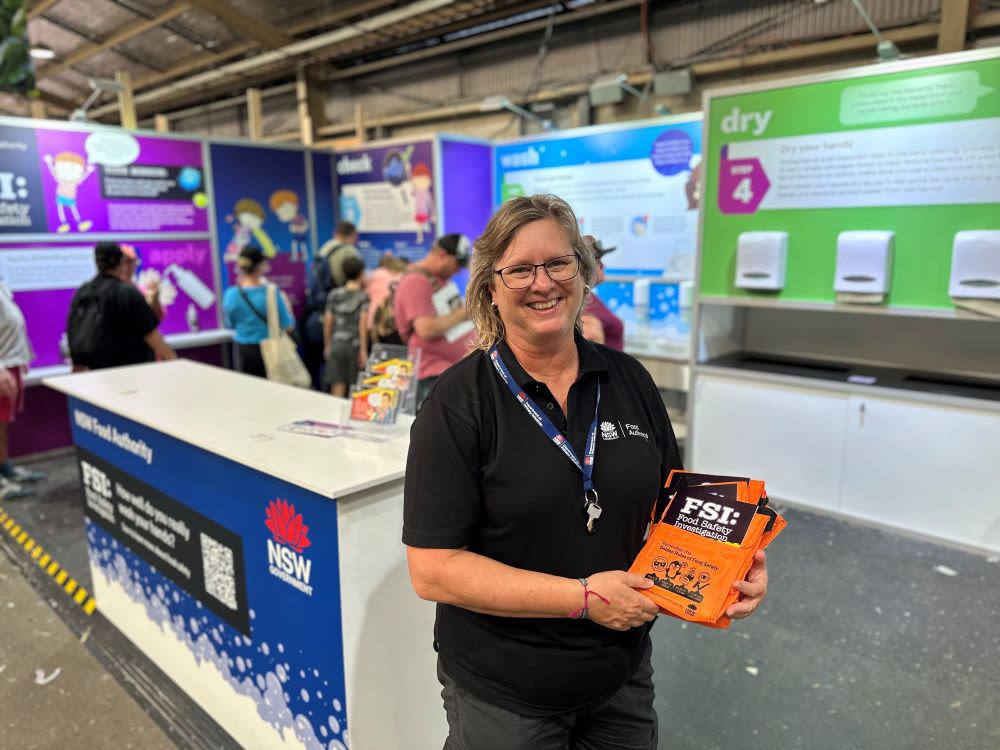
NSW Food Authority CEO Dr Lisa Szabo
NSW Food Authority CEO Dr Lisa Szabo
Champion Sydney Rock Oyster win
The Sydney Royal Aquaculture competition was held at the recent Sydney Royal Easter Show with an expert judging panel ‘blind’ tasting 30 Sydney Rock Oyster entries to crown the best-of-the-best.
Once again, South Coast’s Tathra Oysters was awarded the top prize of Champion Commercial Sydney Rock Oyster, supported by the NSW Food Authority – congratulations!
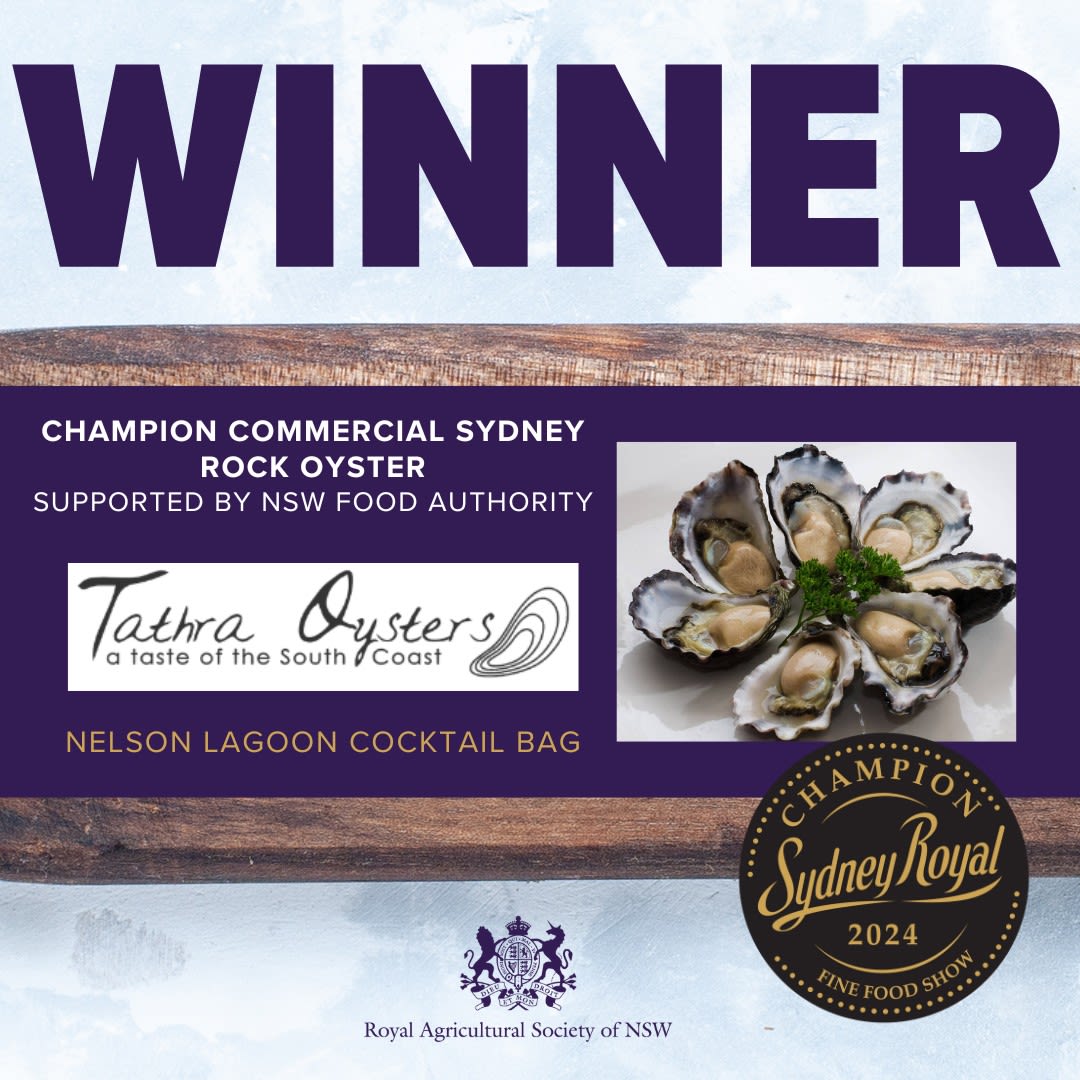
Champion rock oyster winner Tathra Oysters.
Champion rock oyster winner Tathra Oysters.
Despite farmers facing challenging conditions, the Royal Agriculture Society of NSW proudly reported that for the first time this year all oyster entries received a medal which demonstrates the high-quality of Australia’s oysters.
DPI staff judges involved had the pleasure of introducing the judging process to the Minister for Agriculture, Tara Moriarty and DPI’s Acting Director General, Sean Sloan.
See all the winners on the RAS website.

Anthony Zammit, Manager Shellfish Program, NSW Food Authority
Anthony Zammit, Manager Shellfish Program, NSW Food Authority
Best use of Precautionary Allergen Labelling is VITAL
How well allergen labelling is understood by consumers can impact life-or-death decisions. Yet research has shown consumers view Precautionary Allergen Labelling (PAL) as “unhelpful and confusing”, and ultimately restricting rather than enabling safe food choices.
PAL statements, such as ‘may contain’ or ‘may be present’, should only be used where the risk for unintended allergen presence exceeds the defined reference dose for that allergen.
The Food Authority encourages manufacturers to follow the Allergen Bureau’s VITAL (Voluntary Incidental Trace Allergen Labelling) Program, a risk-based methodology to assessing the impact of allergen cross contact.
Reducing and/or eliminating allergen cross contact where possible, and describing risk clearly, accurately and consistently using a scientific approach, enables consumers to trust the information provided.
For more information, including the free VITAL Program food industry guide, visit the VITAL Program website.
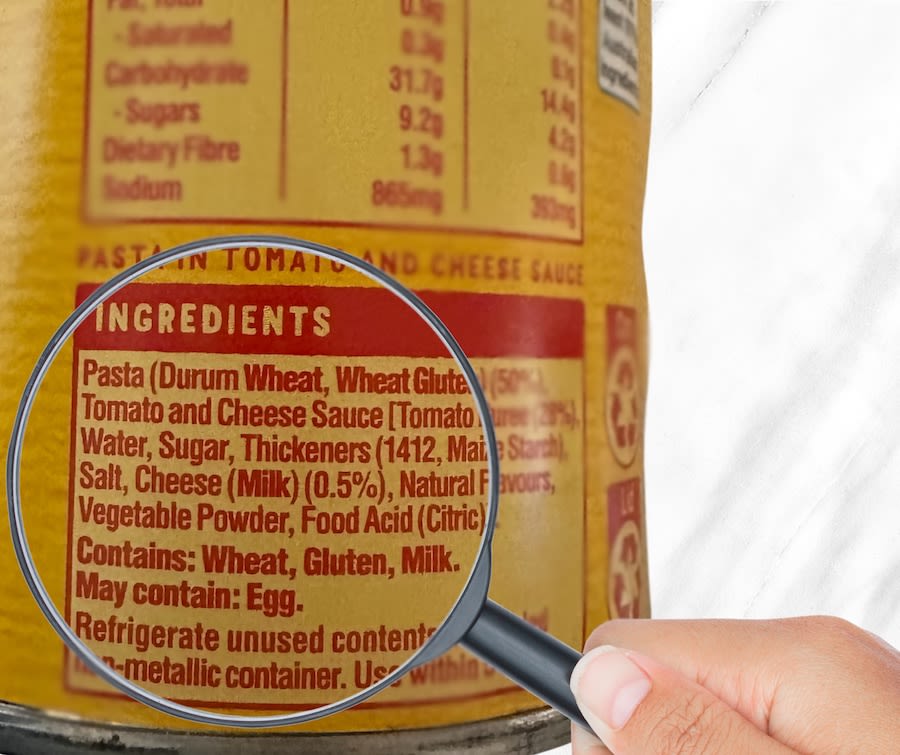
Food Ministers’ Meeting communique – 3 May 2024
The Food Minister’s Meeting, chaired by the Hon. Ged Kearney MP, met via video conference on 3 May 2024. The Food Minister’s Meeting members are the Australian and New Zealand ministers responsible for food regulation.
Key outcomes from the meeting included discussions on:
- Progressing the review of the Food Regulation Agreement – the Food Regulation Agreement is an inter‑governmental agreement between all Australian governments committing to a national system of food regulation.
- Regulatory considerations for cell-based human milk products
- Consumer Insights Tracker results
- Health Star Rating: Monitoring against first uptake target
For more detail on each of these outcomes, visit the Food Regulation website.
Avian influenza is not a food safety concern
In June 2024, the Food and Agricultural Organisation of the United Nations (FAO) released a rapid risk assessment on the risk of people acquiring avian influenza A (H5N1) from food. The FAO found this to be negligible.
Their conclusion is based on:
i. Avian influenza A does not transmit to humans via food, based on epidemiological evidence;
ii. Its presence in foods is limited to those derived from food-producing animals infected with the virus;
iii. The presence of infectious virus can be readily reduced through routine control measures (cooking, pasteurization).
Avian influenza was recently detected in commercial poultry in the Greater Sydney Basin and a Biosecurity Control Order is now in force.
NSW DPI is investigating the biosecurity measures that will be required to manage the outbreak. For more information, and to stay up to date, visit:
- NSW DPI – Avian influenza ALERT
- Media Statement - Food Standards Australia New Zealand
- NSW Food Authority – Avian influenza (bird flu)
- FAO - Preliminary rapid risk assessment of foodborne avian influenza A (H5N1) virus
Avian influenza is a nationally notifiable disease. If you see unusual signs of disease or suspect an exotic disease in your poultry, immediately call:
- the Emergency Animal Disease (EAD) hotline 1800 675 888
- your veterinarian, or
- an LLS District Vet.
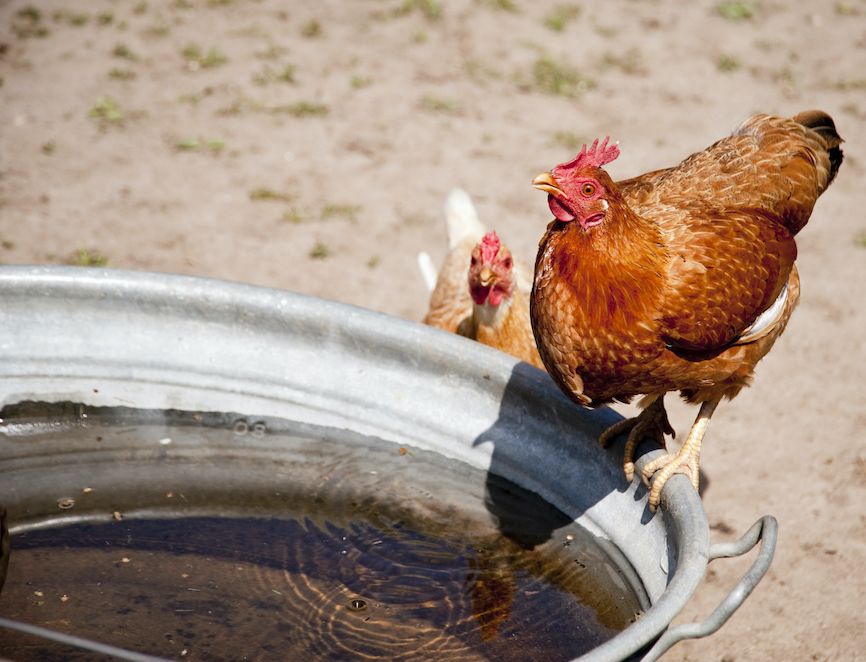
Retail
Six months to go in Standard 3.2.2A extension
School canteens, childcare centres, supermarkets and a range of other retail food businesses have 6 months to meet new requirements under Standard 3.2.2A of the Food Standards Code.
Last year school canteens, children's services that supply food, supermarkets, greengrocers, delis, coffee vendors that sell food, correctional centres and boarding schools were granted an extension until 8 December 2024 to comply with the new standard, which introduced 2 or 3 food safety requirements, depending on the business.
Most retail food businesses will need to appoint a Food Safety Supervisor, ensure food handlers are trained, and be able to show their food is safe under Standard 3.2.2A.
For more information, including a range of resources, visit the Food Authority website.
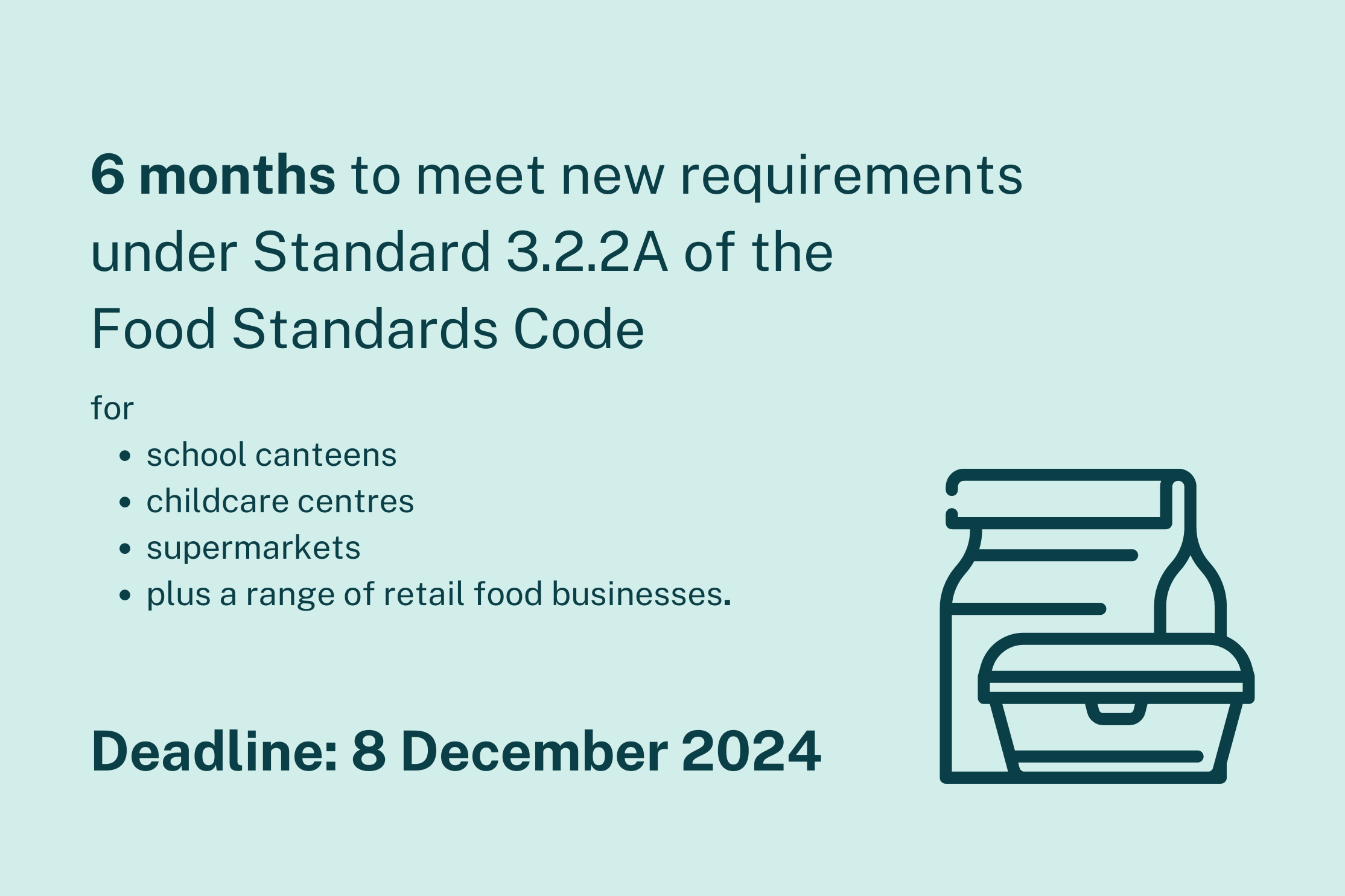
Six months to go in Standard 3.2.2A extension
Six months to go in Standard 3.2.2A extension
Food safety the order of the day at Northern Beaches event
More than 140 food businesses from across the Northern Beaches Council area ate up every minute of an information session highlighting the importance of food safety earlier this month.
NSW Food Authority CEO Dr Lisa Szabo said the Retail and Food Service Information Session was one of three held across the state in partnership with local councils each year to foster a culture of food safety in the sector.
“These sessions are a chance for food business operators to come together, network and talk about food issues specific to their area,” she said.
“We also provide a refresher on the basics to prevent foodborne illness, like cleaning and sanitising and handwashing, as well as allergen management and our Scores on Doors initiative.”
The event was officially opened by Northern Beaches Council mayor Cr Sue Heins, who provided the welcome address. Guest speakers from Sydney Water and the Environmental Protection Authority provided food-focused presentations on the commercial use of water, water initiatives, food waste and sustainability.
Read more here.
Is your Council interested in hosting a Retail Information Session?
Expressions of Interest will be sought from Councils who wish to host an event in partnership with the NSW Food Authority for the 2025/26 calendar year in October 2024.
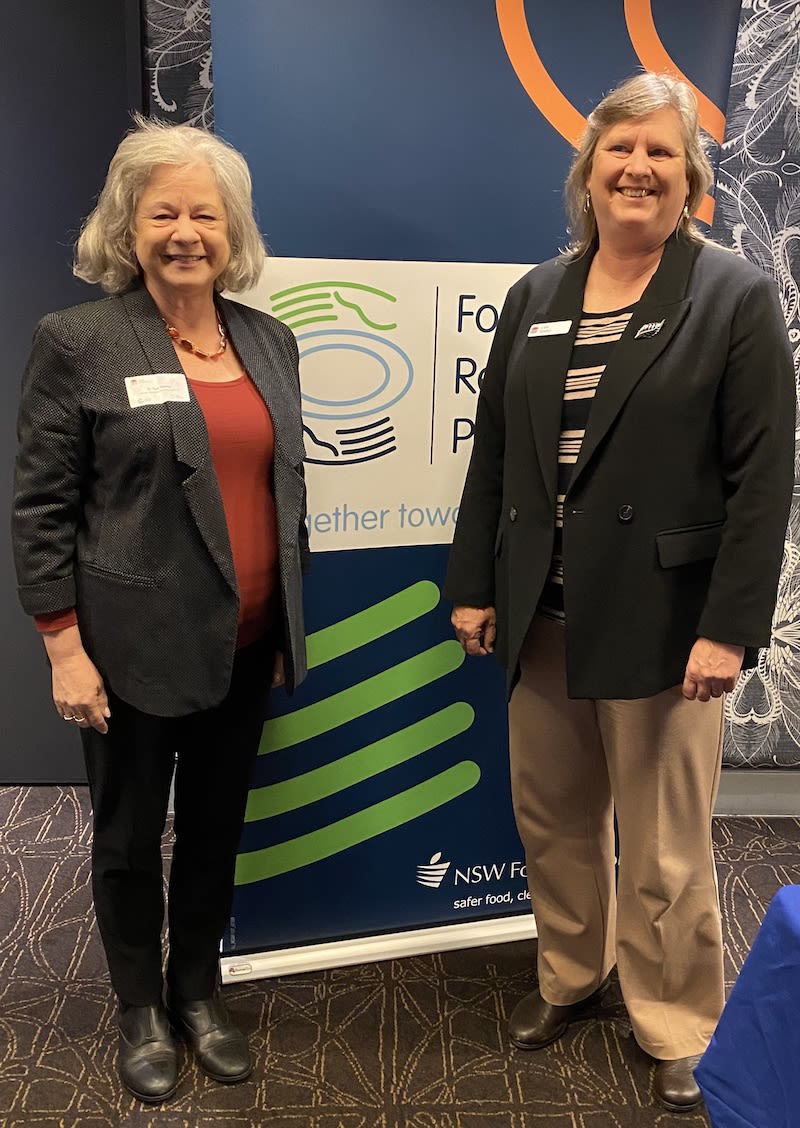
Northern Beaches Council mayor Cr Sue Heins with NSW Food Authority CEO Dr Lisa Szabo.
Northern Beaches Council mayor Cr Sue Heins with NSW Food Authority CEO Dr Lisa Szabo.
SAVE THE DATE: Retail & Food Service Information Session - Dubbo
The next Retail and Food Service Information Session (RIS) will be held with Dubbo Regional Council from 9am on Tuesday, 17 September 2024 at the Western Plains Cultural Centre, 76 Wingewarra St, Dubbo NSW 2830.
If you’re a retail food business in the local council area, or surrounding local government area, join Dubbo Regional Council Environmental Health Officers and NSW Food Authority representatives to learn how to instil and strengthen a culture of food safety in your retail food business to keep food safe and your customers free from foodborne illness.
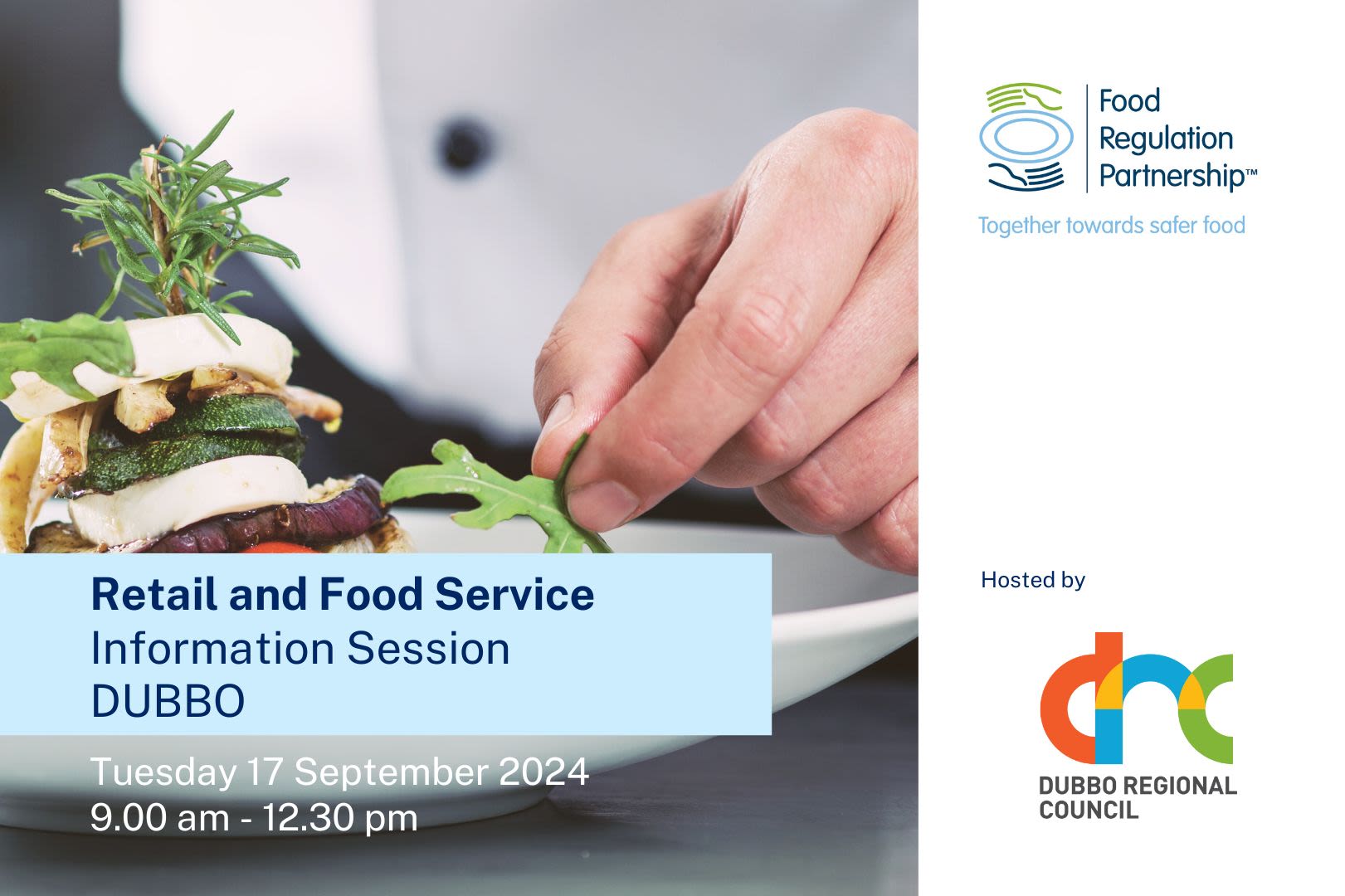
Meat
Inspections and audits
From January 2024 – March 2024, the Food Authority conducted 134 inspections and 156 audits of licensed meat businesses. This sector has seen a 2% increase in compliance, now at 92% compared to the same period in 2023. Corrective actions relating to analytical testing and the level of preservative use in processed meats were identified and actioned. Poor understanding of the food standards that limit preservative use in processed meats was found to be the contributing factor.
The Food Authority will be providing guidance and educational materials to key stakeholders, industry and regulated businesses and will continue to target future compliance activities within the meat retail sector to address the risks associated with the use of preservative and individual poor performance.
The table below shows comparable data for compliance and audit activity in the meat sector between the same reporting periods in 2023 and 2024.
|
Reporting Period |
Jan – Mar 2023 |
Jan – Mar 2024 |
|---|---|---|
|
Audits & Inspections |
352 |
290 |
|
Compliance rate |
90% |
92% |
Meat Industry Consultative Council
The last Meat Industry Consultative Council was held on 9 April 2024.
Issues considered by the Council via video conference during the meeting included updates on:
- Meat industry food safety compliance activities for the period July – December 2023.
- Poultry Standards and Guidelines
- Virtual fencing
- Renewing the Australian Animal Welfare Strategy
- Sheep and Goat Electronic Identification (eID)
A full summary of meetings outcomes is available here.
More information about the Meat Industry Consultative Council, including its purpose, functions, and membership can be found on the NSW Food Authority website.
Seafood and Shellfish
Inspections and audits
From January 2024 – March 2024, the Food Authority conducted 23 inspections and 80 audits of licensed seafood businesses resulting in a 3% increase in compliance, compared to the same reporting period in 2023.
The main areas where critical defects have been raised at audit were for analytical testing, process control (failure to complete monitoring records), and food safety program issues. The Food Authority may need to adjust its planned activities and frequency of compliance monitoring depending on emerging risks and strategic priorities. Complaints, inspections, and investigations relating to seafood businesses will continue to be managed on an as needs basis.
The table below shows yearly comparable data for compliance and audit activity in the seafood sector between the same reporting periods in 2023 and 2024.
|
Reporting Period |
Jan – Mar 2023 |
Jan – Mar 2024 |
|---|---|---|
|
Audits & Inspections |
52 |
103 |
|
Compliance rate |
92% |
95% |
NSW Seafood Industry Forum
The last Seafood Industry Forum was held on 8 May 2024.
Issues considered by the Forum via video conference during the meeting included updates on:
- Seafood industry food safety compliance activities for the period July – December 2023.
- White spot response and program update
- Biosecurity update – specifically in relation to the Biosecurity (Abalone viral ganglioneuritis) Control Order 2024 which was implemented on 24 February 2024 for a duration of two years.
A full summary of outcomes from this meeting are available to view on the Food Authority website here.
More information about the Seafood Industry Forum, including its purpose, functions, and membership can be found on the NSW Food Authority website.
NSW Shellfish Committee meeting outcomes
The NSW Shellfish Committee, which provides advice to the Minister and the Food Authority on the operation of the NSW Shellfish Program, met on 8 May.
Issues considered by the Committee during the meeting included updates on:
- Harvest area management report
- CRC Sensor Network Update
- Vibrio parahaemolyticus outbreak review
- Creation of shellfish wet storage best practice guidelines
All outcomes from this meeting are available to view on the Food Authority website here.
More information about the NSW Shellfish Committee, including its purpose, functions, and membership can be found on the NSW Shellfish Committee – Meeting webpage.
The Committee will next meet on 7 August 2024.
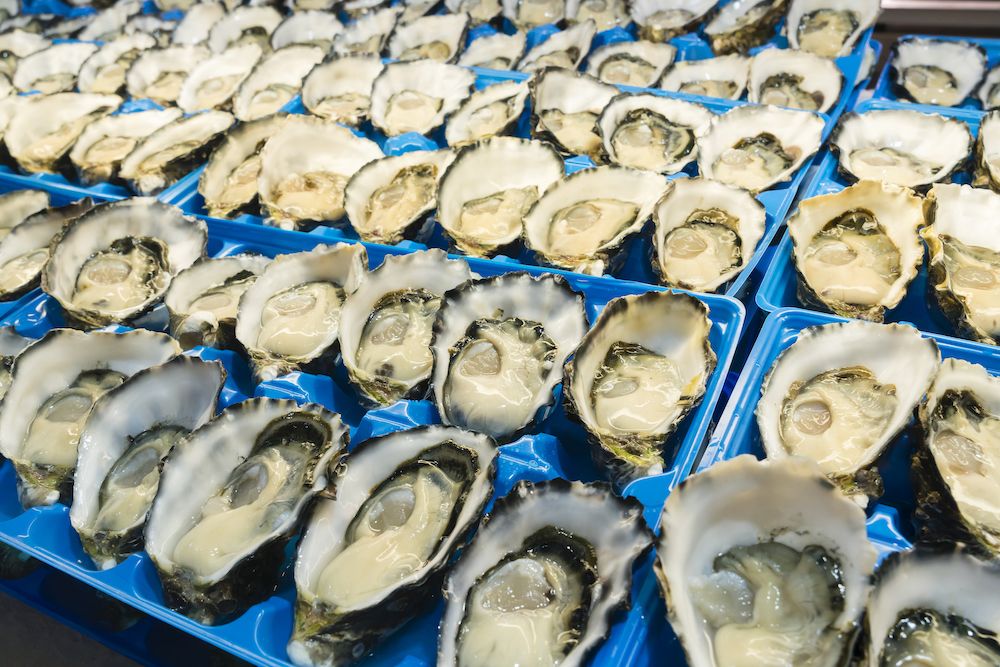
Seafood industry’s top achievers honoured
The NSW Food Authority was proud to continue its support of the seafood industry by sponsoring the Primary Producer Award (NSW) at the prestigious Sydney Fish Market’s Seafood Excellence Awards held in Sydney in April.
This award is presented to a NSW-based primary producer that has demonstrated excellence in the sustainable production of quality seafood through innovation in fishing or aquaculture practices.
The award was presented to Troy Billin of Yamba Fisheries - a passionate fisher whose holistic approach to managing the movement of seafood from catch to buyer ensures a high-quality product is supplied every time.
In addition, a Highly Commended award for the category was presented to the Byrnes Family who in 2016 established Great Lakes Fisheries in Forster and have set a new standard for cost efficient service provision for local fishermen, supplying award winning quality seafood.
Check out the winners across the 11 award categories. Winners will be put forward as the NSW nominees for the National Seafood Industry Awards to be held at the Seafood Directions Conference in September.
Congratulations and good luck to all in September.

Primary Producer Award (NSW) winner Troy Billin of Yamba Fisheries with Hon. Tara Moriarty Minister for Agriculture and Grey Dyer CEO of Sydney Fish Market
Primary Producer Award (NSW) winner Troy Billin of Yamba Fisheries with Hon. Tara Moriarty Minister for Agriculture and Grey Dyer CEO of Sydney Fish Market
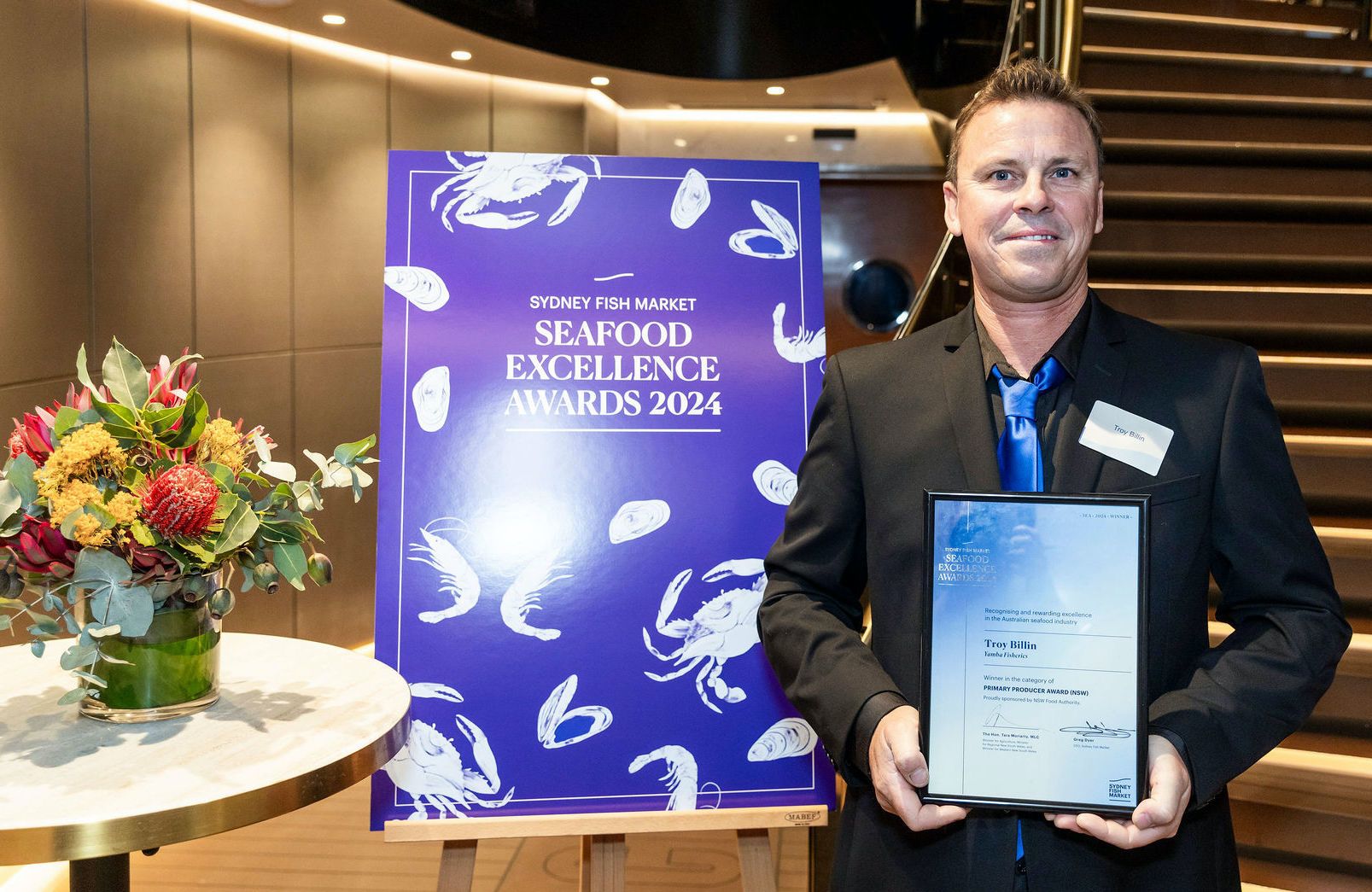
Primary Producer Award (NSW) winner Troy Billin of Yamba Fisheries
Primary Producer Award (NSW) winner Troy Billin of Yamba Fisheries
Dairy
Inspections and audits
From January 2024 – March 2024, the Food Authority conducted 15 inspections and 98 audits of licensed dairy businesses resulting in an improvement in compliance, up 2% to 98% overall, when compared with the same period in 2023.
The main Corrective Action Requests (CAR’s) issued during the period were for hygiene & sanitation, food safety program, and product labelling.
The table below shows yearly comparable data for compliance and audit activity in the dairy sector between the same reporting periods in 2023 and 2024.
|
Reporting Period |
Jan – Mar 2023 |
Jan – Mar 2024 |
|---|---|---|
|
Audits & Inspections |
148 |
9113 |
|
Compliance rate |
96% |
98% |
Leading the way and winning Awards for raw milk cheese production in Australia
Pecora Dairy - a sheep milk and dairy producer based in the NSW Southern Highlands was recently awarded the prestigious Royal Agricultural Society of NSW (RAS) 17th Annual President’s Medal for their ‘Yarrawa’ exhibit - a semi-hard raw sheep milk cheese, that stands as an Australian first.
It was only in 2016 that Food Standards Australia New Zealand changed the regulations to allow raw milk cheese production, and since that time Pecora Dairy has worked with the NSW Food Authority to become the first operator licensed to manufacture raw milk cheese in Australia.
It is still illegal to sell raw milk as a food in Australia as it has not undergone a heat treatment process such as pasteurisation, which is important as it kills any harmful bacteria that might be present.
To manufacture raw milk cheese in NSW, a business must be licensed and have their raw milk cheese process approved by the NSW Food Authority.
The President’s Medal celebrates inspirational, innovative agricultural food and beverage achievers across Australia. There are more than 4,000 entrants from 276 classes, 81 of whom have a chance to win a top honour.
Congratulations to Pecora Dairy for being awarded with such a top honour, and for leading the way for raw milk cheese production in Australia.
Interested in producing raw milk cheese in NSW?
Manufacture of raw milk cheeses for human consumption must be approved by the relevant state authority in each jurisdiction before raw milk cheese can be produced – for businesses in NSW, this is the NSW Food Authority.
There are a number of steps and scientific trials that cheese makers wishing to manufacture raw milk cheese must go through in order to demonstrate compliance with food safety standards.
More information:
- Dairy Processing | NSW Food Authority website provides advice for any business interested in producing raw milk cheese in NSW, including access to a production process pro forma, which is a written description by the business of the steps used to make a particular product. The Food Authority will review the pro forma and must provide approval before manufacture can begin.
- Raw Milk Cheese Decision Support Tool – external site: this tool was developed to assist cheese producers and food safety managers assess whether a particular raw milk cheese, and process, satisfies Australian regulations for safe production.
Watch the 17th Annual Presidents Medal Finalist video featuring Pecora Dairy: (video: courtesy of Royal Agricultural Society of NSW)
Managing fall armyworm in Coastal NSW Dairy Production
Fall armyworm (FAW) has posed significant challenges to dairy production in coastal NSW since its first recording in Australia in 2020. The 2023/2024 summer saw a substantial increase in FAW numbers, affecting pastures essential for dairy, such as maize, ryegrass, oats, and kikuyu.
Control efforts have been inconsistent due to high insecticide resistance and the limited treatment options available. Chemical residues in milk are a real risk if withhold periods are not adhered to or off label use is applied. Effective monitoring is crucial, with emphasis on inspecting fields for eggs, larvae, and damage signs.
NSW DPI and Local Land Services are collaborating on research and management strategies, including developing alternative forage crops like brassicas to mitigate FAW impact on dairy pastures. NSW DPI also offers a free larval identification service to aid in better FAW management for dairy producers.
You’ll find more information on management of FAW in the dairy industry in the NSW DPI Dairy Newsletter.
Eggs
Inspections and audits
From January 2024 – March 2024, the Food Authority conducted 5 inspections and 10 audits of licensed egg businesses. Compliance across the egg industry remains high with 95% compliance during the period.
The main areas where critical defects have been raised at audit were for process control, analytical testing, and food safety program monitoring. There have been no consecutive failures and most defects raised have been rectified immediately which demonstrates that effective corrective actions are being implemented by businesses.
The table below shows yearly comparable data for compliance and audit activity in the egg sector between the same reporting periods in 2023 and 2024.
|
Reporting Period |
Oct – Dec 2022 |
Oct – Dec 2023 |
|---|---|---|
|
Audits & Inspections |
26 |
15 |
|
Compliance rate |
95% |
95% |
Egg Industry Consultative Committee
The last Egg Industry Consultative Committee was held on 10 April 2024.
Issues considered by the Committee via video conference during the meeting included updates on:
- Egg industry food safety compliance activities for the period July – December 2023.
- The Biosecurity (Salmonella Enteritidis) Control Order
- Primary Production and Processing Standard for Eggs and Egg Product (Standard 4.2.5)
- Poultry Standards and Guidelines
- Livestock Processing Establishment Standards and Guidelines
- Renewing the Australian Animal Welfare Strategy
A full summary of meetings outcomes is available here.
More information about the Egg Industry Consultative Committee, including its purpose, functions, and membership can be found on the NSW Food Authority website.
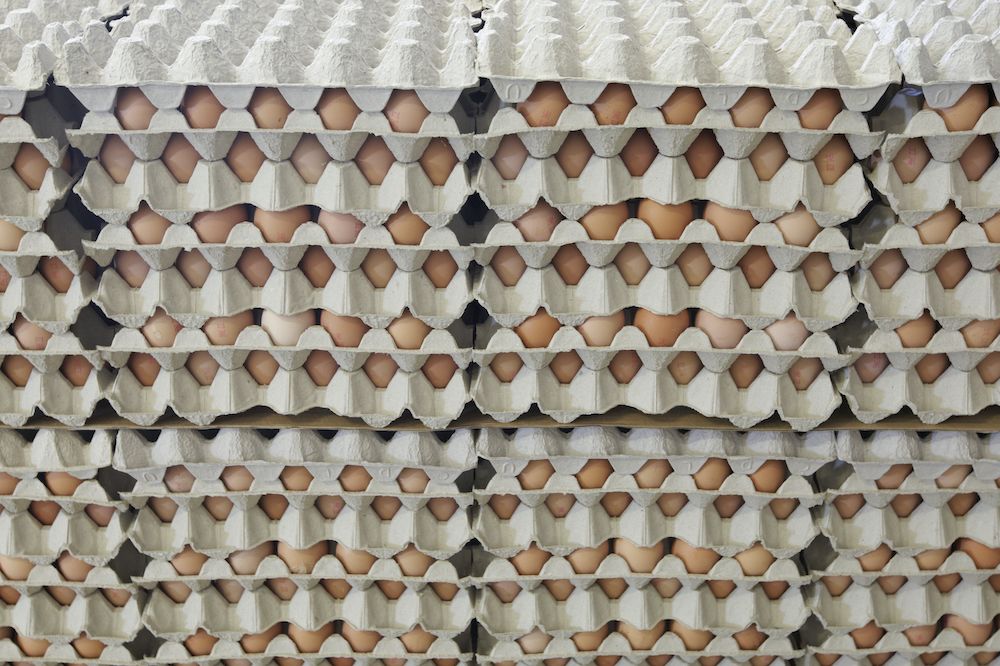
Plants
Inspections and audits
From January 2024 – March 2024, the Food Authority conducted 5 inspections and 12 audits of licensed plant product businesses, resulting in an improvement in compliance, up 2% to 88% overall, when compared with the same period in 2023.
The main Corrective Action Requests (CAR’s) issued were for failing to comply with process control requirements, food safety programs, and pre-requisite programs.
The table below shows yearly comparable data for compliance and audit activity in the plant sector between the same reporting periods in 2023 and 2024.
|
Reporting Period |
Jan – Mar 2023 |
Jan – Mar 2024 |
|---|---|---|
|
Audits & Inspections |
18 |
17 |
|
Compliance rate |
86% |
88% |
Stay informed – new food safety requirements for berries, leafy vegetables and melons
New national food safety standards for growers and processors of berries, leafy vegetables and melons apply from 12 February 2025.
The standards aim to strengthen food safety and traceability throughout the supply chain of these products and apply to businesses that:
- grow and/or harvest berries, leafy vegetables or melons
- do early-stage processing of berries, leafy vegetables or melons.

Food safety grower guides
Food safety grower guides
Growers and processers can begin preparing for the new requirements by adopting the practices outlined in the Fresh Produce Safety Centre’s Food Safety Grower Guides (available in 6 languages).
The Food Authority is working on how the standards will be implemented in NSW; and developing resources to assist growers and processers of berries, leafy vegetables and melons adjust to the new requirements when they take effect.
Sign up to the NSW Food Authority’s email list to stay informed about the new national food safety standards and assist with resource development.
Vulnerable People
Inspections and audits
The Food Authority conducted 6 inspections and 244 audits of licensed hospitals and aged care businesses during the period from January 2024 – March 2024. Compliance across the vulnerable persons industry remains high and achieving 99% compliance during the period.
The main Corrective Action Requests (CAR’s) issued during the period were for pre-requisite programs (failing to correctly implement calibration program) and process control (failure to complete monitoring records at the frequency required in the food safety program).
The table below shows yearly comparable data for compliance and audit activity in the vulnerable persons sector between the same reporting periods in 2023 and 2024.
|
Reporting Period |
Jan – Mar 2023 |
Jan – Mar 2024 |
|---|---|---|
|
Audits & Inspections |
222 |
250 |
|
Compliance rate |
99% |
99% |
TPAs
TPA audit data
Third party auditors (TPA’s) conducted 269 audits between 1 January to 31 March 2024 taking an average of 3.2 hours to complete an audit across the five industry sectors TPA’s operate in. Of these, over 99% of audits attained an acceptable audit outcome with just the single unacceptable audit (n=1) reported in the VP sector.
The table below outlines the results across specific industry sectors services by TPA’s.
|
Total audits |
Acceptable audits (%) |
Average audit time (hrs) |
|
|---|---|---|---|
|
Dairy farms |
59 |
100 |
1.8 |
|
Cold stores |
1 |
100 |
3.5 |
|
Seafood processing |
2 |
100 |
3.1 |
|
Vulnerable Persons |
206 |
99.5 |
3.5 |
|
Plant products |
1 |
100 |
4.2 |
|
TOTAL |
269 |
99.9% |
3.22 |
TPA workshop - the Future of Food
The Future of Food was the theme of the 2024 Workshop for Third Party Auditors (TPAs) hosted by the NSW Food Authority in May.
Up to 50 TPAs and department staff gathered at the annual event, which provides Regulatory Food Safety Auditors - who conduct third-party compliance audits for the department, an opportunity to engage and learn about updates in the auditing field and the NSW food industry more broadly.
Dr Lisa Szabo, Director Food Safety and CEO Food Authority opened the day and shared the inspiring vision and journey that led to the agency’s establishment 20 years ago.
The day’s presentations and discussions included data analytics and trend forecasts from the 2022/23 auditing activities, what occurs behind the scenes when an auditor identifies a facility has achieved an unacceptable audit outcome, lessons in Listeria and understanding the requirements for serving ready-to-eat meats to vulnerable persons.
Participants had the opportunity to ask questions during the Q&A panel session, before guest speaker Dr Julian Cox, Associate Professor of Food Microbiology at the University of NSW, provided an informative presentation on the future of food safety. Dr Cox’s closing remarks reinforced that food safety is not just for experts, it’s for everyone:
“We all have that opportunity to educate the general community about food safety and we can all do that. Food safety is people. It’s me, it’s you, it’s us, the consumer and the producer and the people making food for their family at home. It’s everyone.”
The day concluded with Greg Vakaci, Director Compliance, who thanked the TPAs for their auditing activities and commitment to ensuring food safety remains their key focus.
Consider scheduling your next audit with a TPA
There are currently 54 licensed TPAs in NSW approved by the NSW Food Authority.
Various licensed businesses with a suitable compliance history are eligible to apply to use a TPA.
TPAs not only provide regulatory food safety compliance audits, they also offer licensees the flexibility to schedule their audits instead of receiving them unannounced.
- View the list of all approved Third Party Auditors
- Information for licensed facilities interested in moving to third party audit
For more information about the benefits of using a TPA, please contact the Food Authority on 1300 552 406 or food.contact@dpi.nsw.gov.au
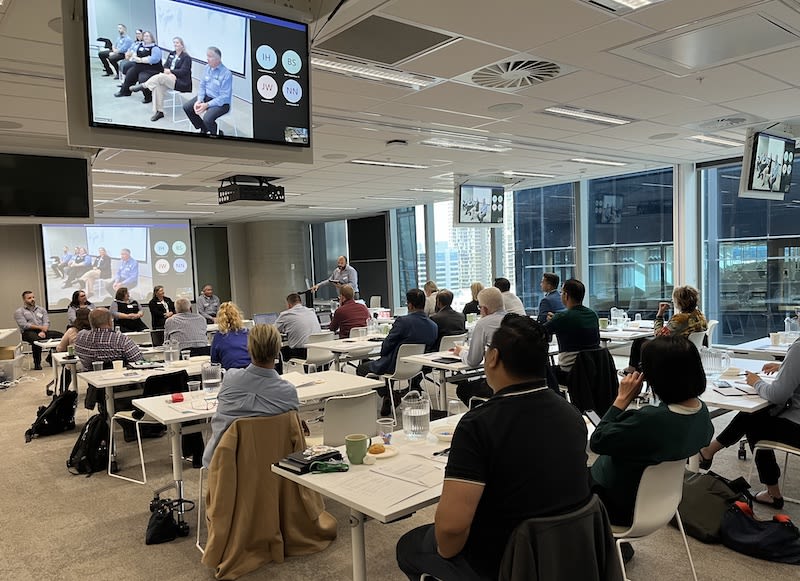
TPA workshop - the Future of Food
TPA workshop - the Future of Food
Manufacturing
NSW Food Manufacture Liaison Group meeting
New South Wales (NSW) is Australia’s largest consumer market, and with over 2,100 food manufacturers based here, it’s big business for the state.
The NSW Food Authority partners with key agencies including NSW Health, the NSW Environmental Protection Authority (EPA) and Local Government. This is done through a consultative approach to ensure effective food safety and food quality management underpins confidence in the state’s food industry.
We value the strong collaborative relationships we have with our partners across the food chain. We seek their feedback in a variety of ways.
Recently, the NSW Food Authority piloted a ‘NSW Food Manufacturer Liaison Group’ forum, bringing together key agencies NSW Health and NSW EPA, as well as representatives from food manufacturing businesses and peak industry bodies in NSW.
The forum provided an opportunity to provide agency and industry updates and discuss current challenges and opportunities. Topics included sustainability, supply chain disruptions – and how to predict future vulnerability, and improving community awareness and education through nutritional and allergen information to ensure consumers can make informed choices.
Additionally, new policies and developments in regulation were discussed, along with how we can best collaborate on research and development to drive innovation in food technology processes.
All agreed that the ‘pilot’ was a success. Attendees expressed strong support for ongoing cross-agency and industry consultation through the NSW Food Manufacture Liaison Group meeting.
The NSW Food Manufacture Liaison Group will meet twice a year with key outcomes shared with the NSW community.
Prosecutions | Processes | Calendar
Prosecution - Phillies
A restaurant in Southern Sydney was recently fined a total of $6,840 after being convicted of six offences under the NSW Food Act 2003.
Further information about this prosecution and other current food safety breaches in NSW can be found on the NSW Food Authority’s Name and Shame register
Processes
Public consultations
Food Standards Australia New Zealand (FSANZ) is seeking feedback on a range of applications to change the Food Standards Code.
For more information see the public consultations page on the FSANZ website.
Calendar items
- World Allergy Week: 23-29 June
- AIFST24 Convention: Sydney, 6-7 August
- International Fresh Produce Safety Symposium: Sydney 20-21 August
- Fine Food Australia: Melbourne, 2-5 September
- NSW Oyster Conference: Port Macquarie, 4-5 September
- Retail Information Session, co-hosted with Dubbo Regional Council: Dubbo, 17 September
Subscribe to news and alerts
Don’t miss a thing! Sign up for our custom email alerts and tips to stay informed on topics that interest you:
